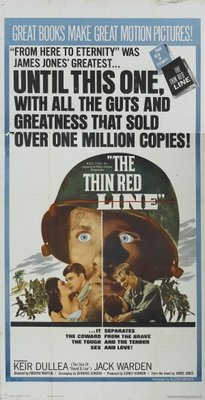
THE THIN RED LINE
US, 1964, minutes, Black and white.
Kier Dullea, Jack Warden, Ray Haley, James Philbrook.
Directed by Andrew Marton.
The Thin Red Line is a 1964 version of James Jones’ novel about the battles in the Solomons and at Guadalcanal. It was remade, quite a lavishly, by Terrence Mallick in 1998, the running time of just over 3 hours.
This version amalgamates many of the characters, has a much shorter running time, and was filmed in black and white. However, it is a very effective staging of the war and character study.
While there a vivid portraits of officers, especially those played by Ray Haley, the humane officer, and James Philbrook the professional soldier, the film focuses on two men, played by Kier Dulea and Jack Warden. Jack Warden is the grizzled professional soldier, obeying the rules, experiencing dissatisfaction with the younger rookie generation. Keir Dulea is the young man, assertive but afraid, not wanting to conform, wanting to do his own thing. He interacts with the sergeant, often bitterly. However, in his intensity, he does achieve quite a number of heroic actions.
The film offers one of the most persuasive presentations of battles and their effect on the men, especially the thin red line between madness and sanity.
The film was directed by Andrew Marton, who made quite a number of action films at MGM in the 1950s including The Wild North, Gypsy Colt and Men of the Fighting Lady.
1. The impact of this war film? James Jones and his war novels? From Here to Eternity? The experience of war, in the Pacific? Ordinary serving men and officers? The battles, the fighting, the harshness, the locations? The experience of death?
2. The title, the saying about the thin red line between sanity and madness?
3. The black and white photography? The musical score? The Pacific islands, the sea, the hills and mountains, the foxholes, the swamps?
4. The staging of the war scenes, the animosity between Japanese and Americans, the feel for the war antagonism? The staging of the battles, the men, the weapons, machine guns, hand grenades, pistols? The overall strategies? The particular tactics?
5. The introduction to the war, the Pacific, the Solomon Islands and Guadalcanal? The strategy for the change in the war? The facts of 1943 and the change?
6. The tour of the boat, the officers and their discussions, the men below deck, their spirit, Stone wanting to be with them? War and fear?
7. The focus on Stone, a humane man, George assisting him? The briefing from the officer, Stone asking questions about men’s lives? The percentages? With the men, taking orders, their harshness? His concern in action? His decisions, supporting his men? The strategies for scaling the mountain, entering the village? His refusal to obey the superior orders? The correctness of his decision? Yet his succeeding? His being stood down, transferred, the Silver Star?
8. The range of men, Doll and Welsh? the ordinary man and the sergeant? The different personalities, the clashes, in action together, Welsh’s death for Doll?
9. Jack Warden as Welsh? His status, military experience? The clash with Doll about the roster list? The issue of madness and its being used to survive? Stone and his orders to change his tactics? Action, Doll taking the pistol, their argument, Welsh leaving it with him? The finding of the grave, Doll fighting the Japanese, Welsh’s reaction? The booby trapped grave? On the mission, his heroism in giving morphine to the dying soldier? Climbing the mountain? Working with Doll? The water and pouring out the remains? The achievement, the threat to Doll, his taking the bullet for him? A representative of the American fighting man?
10. Doll, the focus of the film, his age, experience, the eight days of his marriage? Fife and his friendship? Their discussions? The significance of his dream, his wife, the sexual elements, the phone call, talking about his number? The arguments with Welsh, his own fear, and wanting to do his own thing, taking the pistol to give him some edge, on land, the issue at the grave, fighting with the Japanese, his vicious killing? The issue of fear that he would like killing? In action, his information about the Japanese nest, the strategy, yet his going straight forward and destroying it? Climbing with Welsh? The final climb, taking the shooting nests in the caves? His mad firing at everyone? Welsh and dying? His survival?
11. Fife, ordinary, friendship, the souvenirs at the grave, Doll and their discussions, Welsh and the chocolate and his throwing it into the river? Dressing up to entertain the soldiers? Doll simply watching? The issue of the watch and his death? Doll and preventing Welsh taking it?
12. The issue of killing, Welsh’s comment that the enemy was just a lump of meat? His saying it about himself at the end?
13. The lieutenant, tough, his orders, relentless, allowing that men will be killed, the risk? With Stone, arguments against him, driving to the site, relieving Stone? At the end and his concern? Forbidding the men to take the elephant?
14. His assistant, unpopular, present for the massacre, the men persuading him that though few in number they would take the elephant?
15. The possibilities of war, the swap, the machine gun nests, climb? The cliffs? Entering the village? The rocks setting off the mines and breaking the barbed wire?
16. In the village, relaxing, the Japanese men hidden, their attack, the massacre?
17. The impact of the scene with the dying man, his screams, needing morphine, Welsh helping him? The reality of war?
18. The 1960s presentation of the Pacific war? Comparisons with the Terrence Mallick’s 1998 version?